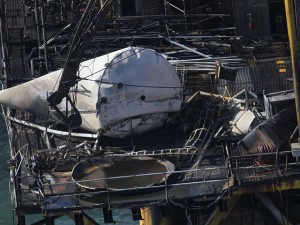Agency: Gulf of Mexico oil firm needs to improve offshore safety

This aerial photograph shows damage from an explosion and fire on an oil rig in the Gulf of Mexico, about 25 miles southeast of Grand Isle, Louisiana. AP
NEW ORLEANS—A federal agency told a Texas-based oil production company Wednesday it needs to improve safety at its offshore operations, days after a deadly explosion and fire on one of its platforms in the Gulf of Mexico that left a Filipino oil worker dead and 11 others injured.
The Bureau of Safety and Environmental Enforcement said Wednesday that Black Elk Energy Offshore Operations has been cited numerous times for incidents in which it failed to comply with regulations.
The bureau noted Friday’s fire and an October 2011 incident where use of an acid-based chemical resulted in the hospitalization of six workers. Another 2010 violation resulted in a $307,000 fine.
“Black Elk has repeatedly failed to operate in a manner that is consistent with federal regulations,” BSEE Director James A. Watson said in a news release. “BSEE has taken a number of enforcement actions, including issuing numerous Incidents of Non Compliance (INC’s), levying civil penalties and calling in the company’s senior leadership to review their performance and the ramifications of failing to improve.”
The bureau’s letter to Black Elk CEO John Hoffman said failure to improve overall performance could lead to steps including revocation of the company’s authorization to operate its offshore facilities. Black Elk’s website says it has an interest in 155 offshore platforms.
Article continues after this advertisementThe body of Elroy Corporal, 42, of Iligan City in the southern Philippine province of Lanao del Norte, was recovered over the weekend. The search was called off Tuesday for another Filipino oil worker, Jerome Malagapo, 28, of Danao, Cebu, who remains missing since Friday’s fire. Four of their compatriots were hospitalized for serious burns after the accident. The cause of the accident is under investigation.
Article continues after this advertisement“We appreciate the perspective of the Bureau of Safety and Environmental Enforcement,” Black Elk spokeswoman Leslie Hoffman said in an emailed response to a request for comment. “Safety is a high priority for Black Elk Energy and we will continue to work cooperatively with local and national federal agencies to understand exactly what happened with the incident at our platform in the Gulf of Mexico.”
BSEE said it ordered Black Elk to submit a performance improvement plan by December 15. And the bureau outlined several steps that must be taken to improve safety. Those include an end to “hot work” on facilities until the company can demonstrate “that steps have been taken, and a safety manager is in place whose responsibility it will be to improve hazard identification, training, and oversight for such operations.”
Hot work is work that can produce flames, sparks or a source of ignition — such as welding or grinding. The Coast Guard said Friday that a torch was in use at the time of the accident. Grand Isle Shipyard Inc., a subcontractor that was doing maintenance on the platform, has said a welding torch was not in use at the time of the accident.
Other steps outlined by BSEE include keeping the site of Friday’s fire shut down, along with other Black Elk facilities where operations have been stopped, or “shut in.” BSEE estimated that 41 Black Elk sites are shut in for various reasons.
Friday’s accident was on a production platform in shallow water off Louisiana’s coast, but it was not producing oil at the time and did not result in a continuous leak of oil, unlike the 2010 Deepwater Horizon disaster. With INQUIRER.net in Manila